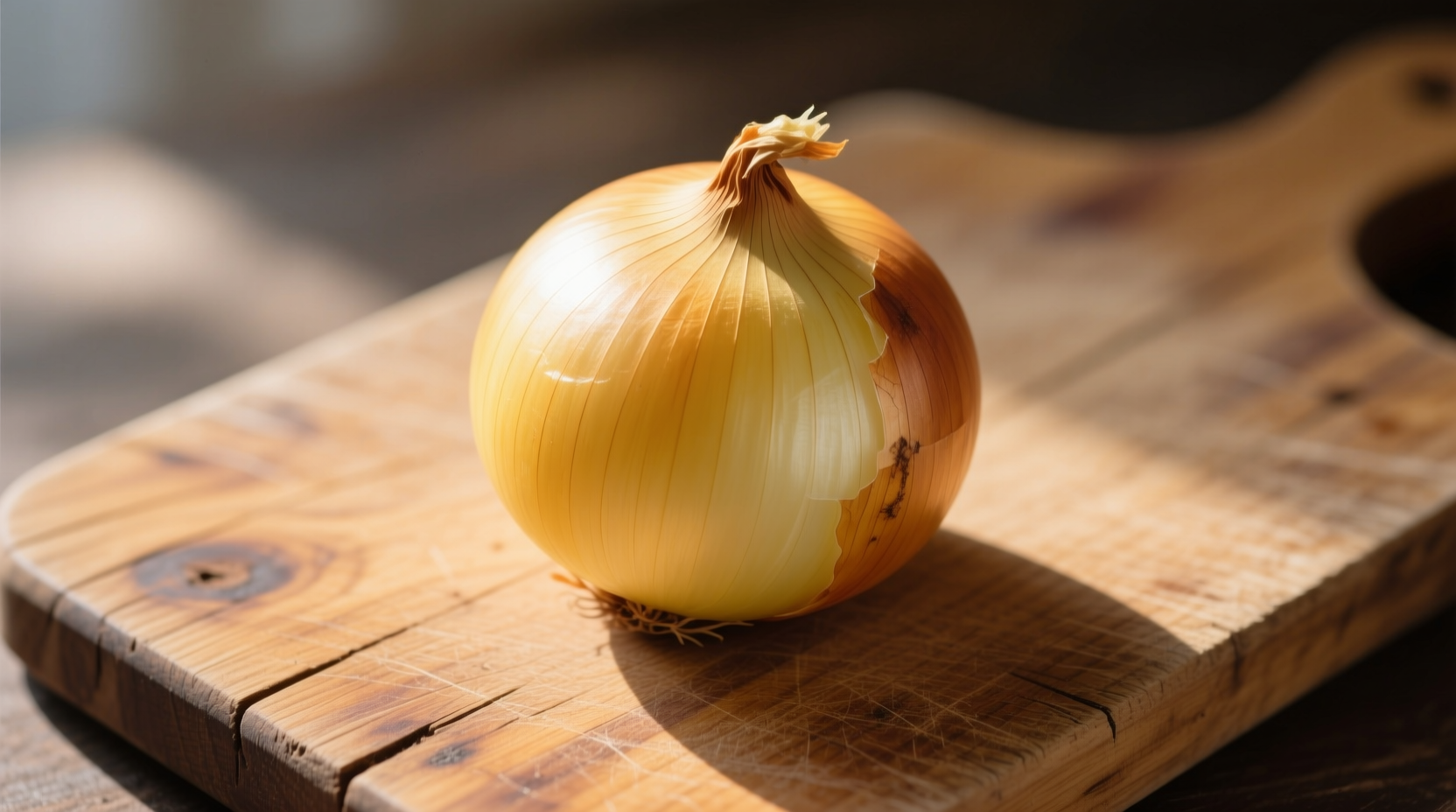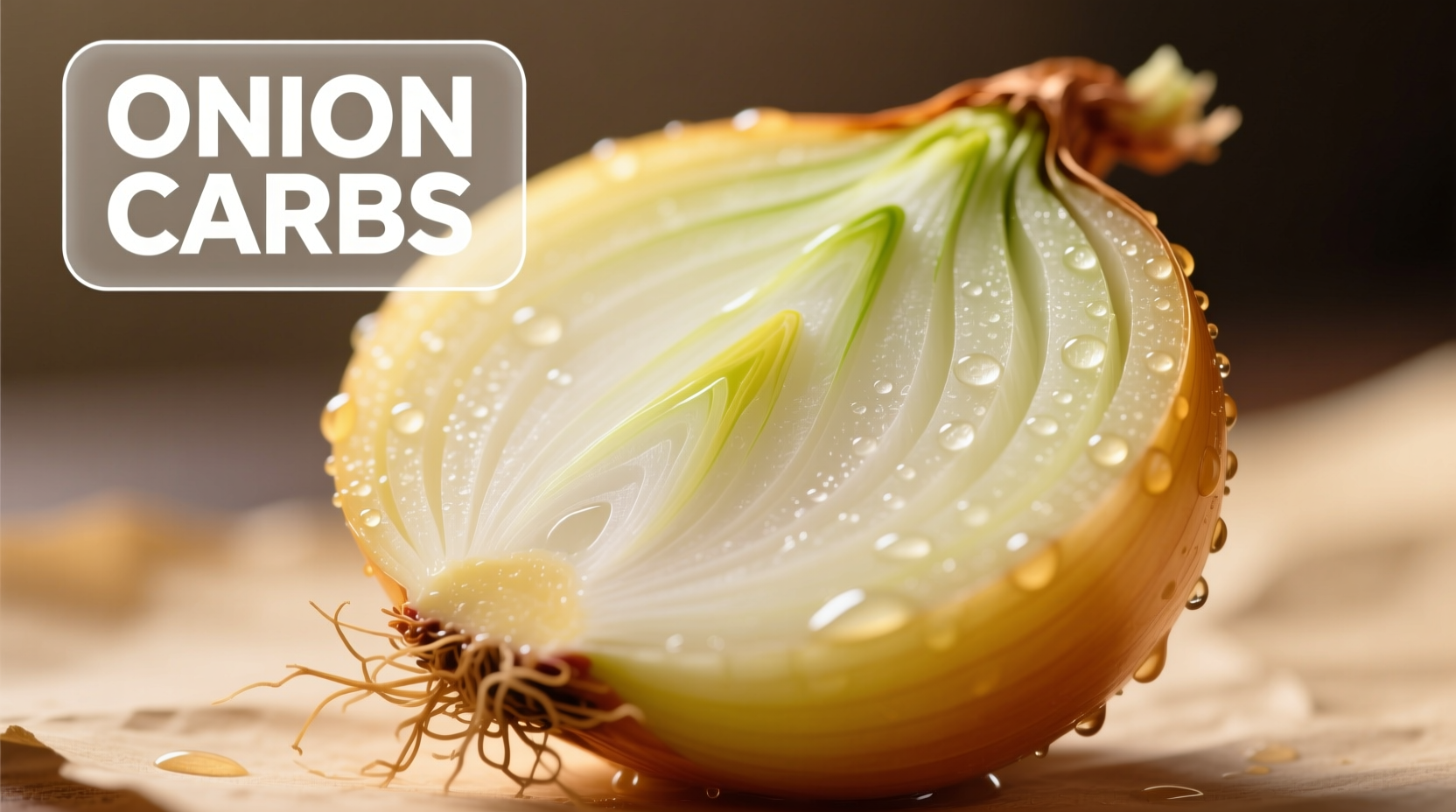One medium raw onion (110g) contains approximately 9.3 grams of total carbohydrates, with 1.9 grams of dietary fiber and 5.5 grams of natural sugars. This results in about 7.4 grams of net carbs per serving, making onions a moderate-carb vegetable that can fit into most balanced diets when consumed in reasonable portions.
Understanding the carbohydrate content of common ingredients like onions is essential for anyone managing their dietary intake, whether for weight management, diabetes control, or following specific eating patterns like keto or low-carb diets. As a culinary professional with extensive experience in food chemistry, I've helped countless home cooks navigate these nutritional considerations without sacrificing flavor.
Breaking Down Onion Carbohydrates: What You Really Need to Know
When evaluating onions from a nutritional perspective, it's crucial to understand that not all carbohydrates affect your body the same way. The total carbohydrate count includes both digestible carbs that impact blood sugar and fiber that passes through your system largely unchanged.
According to the USDA FoodData Central database, here's the complete carbohydrate breakdown for a medium raw onion (110g):
| Nutrient | Amount | % Daily Value* |
|---|---|---|
| Total Carbohydrates | 9.3g | 3% |
| Dietary Fiber | 1.9g | 7% |
| Sugars | 5.5g | - |
| Net Carbs | 7.4g | - |
*Percent Daily Values are based on a 2,000 calorie diet. Your daily values may be higher or lower depending on your calorie needs.

How Different Onion Varieties Compare
Not all onions are created equal when it comes to carbohydrate content. The variety, preparation method, and serving size all significantly impact the final carb count. Here's how common onion types compare per 100g serving:
| Onion Type | Total Carbs (g) | Fiber (g) | Net Carbs (g) | Best For |
|---|---|---|---|---|
| Yellow Onion (raw) | 9.3 | 1.7 | 7.6 | General cooking, caramelizing |
| Red Onion (raw) | 8.9 | 1.6 | 7.3 | Salads, pickling, raw applications |
| White Onion (raw) | 8.5 | 1.5 | 7.0 | Mexican cuisine, salsas |
| Green Onions (raw) | 7.3 | 2.6 | 4.7 | Garnishes, light cooking |
| Shallots (raw) | 16.8 | 3.0 | 13.8 | Finishing dishes, delicate sauces |
| Caramelized Onions | 12.0 | 1.8 | 10.2 | Flavor enhancement, small portions |
This comparison reveals an important truth: green onions offer the lowest net carb option among common onion varieties, making them particularly valuable for those following strict low-carb diets. Meanwhile, shallots pack nearly double the carbohydrates of other onion types, which many home cooks don't realize when substituting them in recipes.
Onions in Specialized Diets: Practical Guidance
Keto Diet Considerations
For those following a strict ketogenic diet (typically 20-50g net carbs daily), onions require careful portion control. While yellow and red onions contain moderate carbs, strategic use can still fit within keto parameters:
- Use 1-2 tablespoons of finely minced raw onion in salads (approximately 0.5-1g net carbs)
- Substitute green onions where possible for lower carb impact
- When caramelizing, remember that cooking concentrates sugars - 1 cup caramelized onions contains about 10g net carbs
- Consider using onion powder sparingly (1 tsp contains about 1.5g net carbs)
Diabetes Management
Despite their carbohydrate content, onions offer significant benefits for blood sugar management. Research published in the Journal of Medicinal Food indicates that onions contain compounds that may help regulate blood glucose levels. The American Diabetes Association recognizes onions as a non-starchy vegetable that can be included regularly in diabetes-friendly meal plans.
The key for diabetes management is portion awareness and pairing onions with protein and healthy fats to moderate blood sugar response. A standard 1/2 cup serving of raw onions (about 55g) contains approximately 4g net carbs, which fits comfortably within most diabetes meal planning frameworks.
Common Misconceptions About Onion Carbohydrates
Several myths persist about onions and carbohydrates that deserve clarification:
- "Onions are high in sugar": While onions do contain natural sugars (about 5.5g per medium onion), this is significantly less than many fruits and processed foods. The sugar content is part of what makes caramelization possible.
- "Cooking removes carbs": Cooking actually concentrates carbohydrates as water evaporates. One cup of raw onions (160g) has about 14g net carbs, while one cup of cooked onions (150g) has approximately 15g net carbs.
- "All onions have the same carb count": As shown in our comparison table, different varieties have significantly different carbohydrate profiles.
Practical Tips for Carb-Conscious Cooking
As someone who's worked in both professional kitchens and with home cooks, I've developed these practical strategies for managing onion carbohydrates without sacrificing flavor:
- Maximize flavor with minimal quantity: Finely mince onions to distribute flavor more effectively, allowing you to use less while maintaining taste impact
- Leverage the pungency spectrum: Use stronger varieties like white onions in smaller quantities since their more intense flavor means you need less
- Combine with lower-carb aromatics: Blend onions with celery, bell peppers, or fennel to reduce overall carb density while maintaining complexity
- Use onion tops and greens: The green parts of scallions contain fewer carbs than the white bulbs and add excellent onion flavor
- Freeze for convenience: Pre-chop and freeze onions in 1-tbsp portions for easy addition to dishes without waste
Remember that the nutritional value of onions extends far beyond their carbohydrate content. They're rich in vitamin C, B vitamins, and antioxidants like quercetin, which offers anti-inflammatory benefits. The key is understanding how to incorporate them appropriately within your specific dietary goals.
Putting It All Together: Smart Onion Usage
Whether you're following a specific diet or simply trying to make more informed food choices, understanding onion carbohydrates helps you make better decisions in the kitchen. The evidence shows that moderate onion consumption provides significant health benefits that outweigh the modest carbohydrate content for most people.
For those with strict carb limitations, strategic selection of onion varieties and portion control allows you to enjoy this versatile ingredient without compromising your dietary goals. The key is awareness and planning—knowing exactly how much you're adding and how it fits into your overall daily intake.











 浙公网安备
33010002000092号
浙公网安备
33010002000092号 浙B2-20120091-4
浙B2-20120091-4